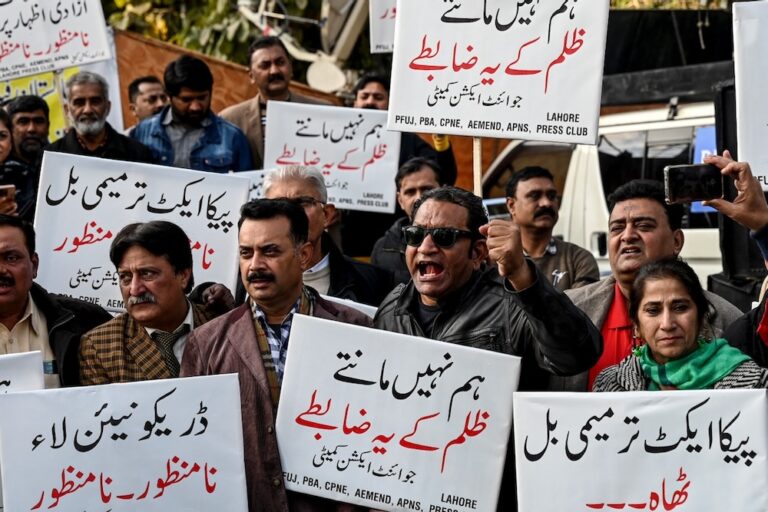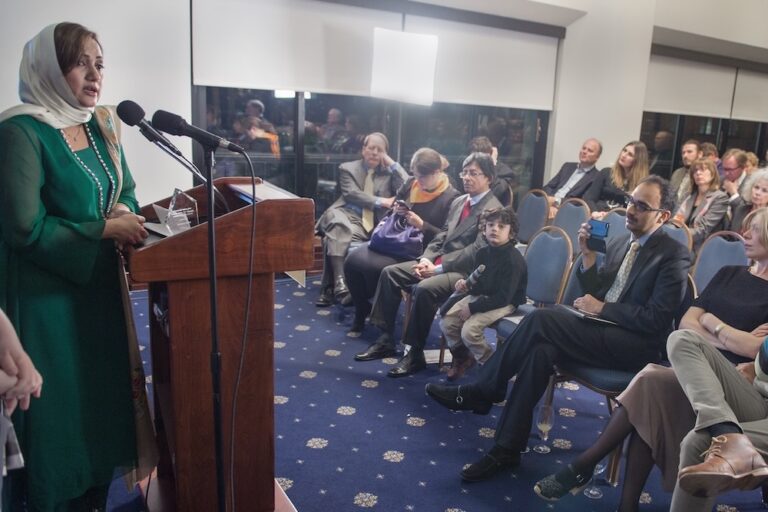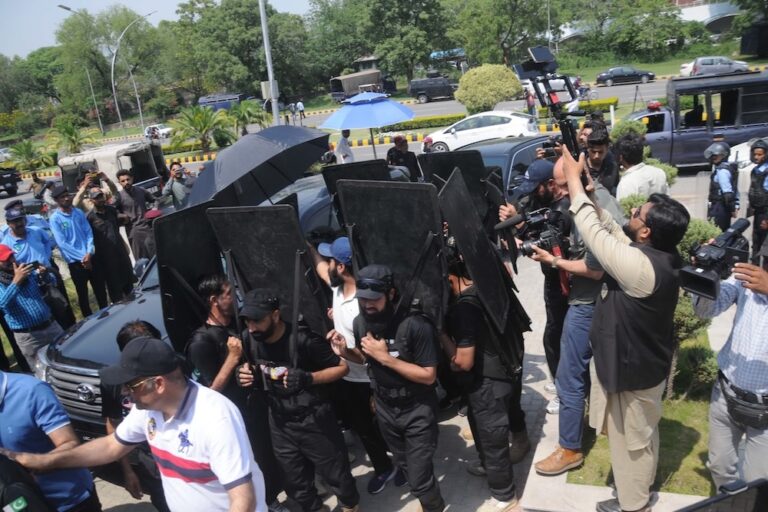(RSF/IFEX) – The 7 February 2005 fatal shooting of reporters Amir Nawab Khan and Allah Noor Wazir in Wana, South Waziristan, was claimed 10 days later by an unknown group calling itself Sipah-e-Islam (Soldiers of Islam). In a fax sent to the English-language daily “The News”, the group said, “We take responsibility for the murder […]
(RSF/IFEX) – The 7 February 2005 fatal shooting of reporters Amir Nawab Khan and Allah Noor Wazir in Wana, South Waziristan, was claimed 10 days later by an unknown group calling itself Sipah-e-Islam (Soldiers of Islam).
In a fax sent to the English-language daily “The News”, the group said, “We take responsibility for the murder of the two journalists in South Waziristan last week (. . .). Some journalists have been working for Christians (. . .). They are being used as tools in the negative propaganda of the Christians against the Muslim mujahideen (. . .). As well as killing two journalists, we mujahideen have killed American spies.” The communiqué was signed by Ahmed Farooqi, a name not known to journalists who specialise in covering jihad groups in Pakistan. The BBC’s Peshawar correspondent, Rahimullah Yousafzai, said, for example, that he had never heard of Sipah-e-Islam and that it would be difficult to verify whether the group actually existed.
The group’s claim supported the position taken by senior officials, including the federal interior minister, who said within hours of the attack that it was an act of terrorism aimed at sabotaging the government’s efforts to pacify the Tribal Areas. Northwest Frontier Province Governor Syed Iftikhar Hussain Shah said that whether the offenders were foreigners or nationals the government would “eliminate” them with the help of the tribal groups.
The authorities had previously singled out Taliban warlord and Taliban commander Abdullah Mehsud, who opposed any peace accord with the army and forcefully rejected any reconciliation with his former mentor, Baitullah Mehsud, and the Pakistani government. He was the ideal suspect but he quickly denied any involvement in the shooting. In a 9 February phone call to the correspondents of both the BBC World Service and the “Daily Times” in Peshawar, Abdullah Mehsud denied his group had anything to do with the killings. “The government committed this murder in order to accuse me (. . .). What I do, I take responsibility for immediately,” he said. During the phone call he also threatened the BBC correspondent with reprisals if he did not publish the entire interview.
A shooting in the centre of Wana
RSF spoke to one of the 10 journalists who were in the van that was targeted in the 7 February attack. The journalist reported, “We were in the town of Wana, near the public hospital, at around 7:30 p.m. (local time) when a white car overtook our van. Two men sitting one behind the other opened fire on us with AK-47 assault rifles. The shooting took place less than 60 metres from the tribal militia’s building. They made no move to stop the attackers (. . .). Noor’s skull exploded while Nawab was hit in the base of the neck. They fired around 60 rounds. Each of them emptied his clip with the aim of killing. After they had finished their job, they did not speed away. They left slowly.”
The journalist continued, “We called for help. Students and members of the tribal militia ran over. They took one of the injured, AFP correspondent Anwar Shakir, to the public hospital where he underwent an operation for a stomach wound.”
Promises to investigate
On 12 February, Lt. Gen. Safdar Hussain, head of military operations in South Waziristan, promised a Tribal Union of Journalists (TUJ) delegation that the killers would be arrested. He also promised that 3,000 euros (approx. US$3,950) would be given to the families of the slain reporters and said the army had undertaken to support the press in the Tribal Areas.
Two days before, Lt. Gen. Hussain told a delegation of tribal chiefs and religious leaders from Wana that the government was analysing all aspects of the journalists’ murder in order to determine whether they had been targeted because of their work, personal quarrels or old enmities.
As the two murdered journalists were TUJ members, the union has been very active in seeking justice for them. TUJ president Sailab Mehsud has travelled to Islamabad and Peshawar to meet with officials. “The killers will be brought to justice,” he has repeatedly been promised.
RSF fully supports the TUJ’s complaints to the civilian and military authorities and calls for a thorough investigation into the attack, exploring all possible leads. The investigation must not stop at the mysterious claims of an unknown group, says the organisation.


